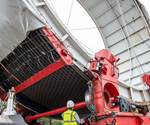Solvay, Baker Hughes to expand use of thermoplastic composites in oil and gas pipes
Solvay and oilfield equipment company Baker Hughes plan to implement thermoplastic composite materials in offshore flexible pipes and risers.
Share

Solvay (Brussels, Belgium) has signed an agreement with Baker Hughes (Houston, Texas, U.S.) on the implementation of thermoplastic composite materials in offshore flexible pipes and risers for the oil and gas industry.
Solvay says that its expertise in composite materials and leadership and innovation in polymers, combined with Baker Hughes’ expertise in oilfield equipment, will help accelerate the adoption of composite technology in the oil and gas industry. Thermoplastic composites are enabling the adoption of flexible risers for ultra-deep waters while requiring lower total expenditure than conventional technologies.
“It’s a privilege to work with one of the world’s leading energy technology companies. Our collaboration with Baker Hughes is a landmark in our strategy to expand the use of thermoplastic composites into new markets, leveraging its lightweight and non-corrodible properties versus metal,” says Augusto DiDonfrancesco, a member of Solvay’s executive committee.
“We believe this partnership with Solvay will accelerate the introduction of non-metallic materials in the energy industry at a time where we are increasing our focus on reduced cost and improved efficiencies,” says Andrea Fibbi, technology executive for oilfield equipment at Baker Hughes.
Thermoplastic composite pipes are flexible and weigh significantly less than conventional equipment, making the installation and connection of new equipment quicker and more cost-effective. Maintenance is also simplified as composites do not corrode and offer superior fatigue resistance, even in deep waters. Flexible pipes associated with FPSO (Floating, Production, Storage and Offloading) vessels enable production system that can be efficiently removed at decommissioning.
Related Content
-
Plant tour: Airbus, Illescas, Spain
Airbus’ Illescas facility, featuring highly automated composites processes for the A350 lower wing cover and one-piece Section 19 fuselage barrels, works toward production ramp-ups and next-generation aircraft.
-
JEC World 2024 highlights: Thermoplastic composites, CMC and novel processes
CW senior technical editor Ginger Gardiner discusses some of the developments and demonstrators shown at the industry’s largest composites exhibition and conference.
-
Welding is not bonding
Discussion of the issues in our understanding of thermoplastic composite welded structures and certification of the latest materials and welding technologies for future airframes.

.jpg;width=70;height=70;mode=crop)












.jpg;maxWidth=300;quality=90)
